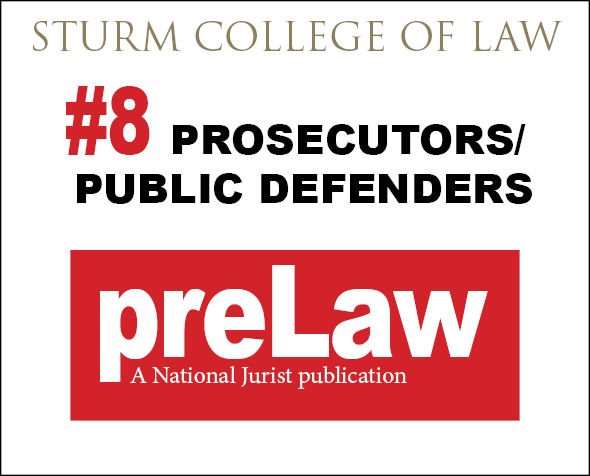Denver Law Faculty Members Promoted
The Sturm College of Law is honored to announce that the Board of Trustees of the University of Denver approved the promotions of seven Denver Law faculty members, effective August 1, 2018: Bernard Chao, Christopher Lasch, and Justin Pidot to the rank of Professor of Law; Kevin Lynch and Lindsey Webb to the rank of Associate Professor of Law, with tenure; and Samantha Galvin and Erin Stearns to the rank of Associate Professor of the Practice of Taxation.
Bernard Chao (Professor of Law)
A graduate of Purdue University (BS, Electrical Engineering) and Duke Law School, Professor Chao is a prolific and widely-respected scholar in the fields of intellectual property and empirical legal studies. A former Silicon Valley patent attorney, he has published a series of provocative articles in top law journals, including the University of Pennsylvania Law Review, the California Law Review, the Washington University Law Review, the Boston College Law Review, and the Wisconsin Law Review. He directs the Intellectual Property Certificate Program at Denver Law and co-directs (with Professor John Campbell) the Denver Empirical Justice Institute. In fall 2018, he will be teaching an innovative course in Contracts as part of the law school’s new Professional Part-Time JD Program.
Christopher Lasch (Professor of Law)
A graduate of Columbia College (BA, History) and Yale Law School, Professor Lasch is a nationally-recognized scholar, teacher, and public commentator on matters at the intersection of immigration law and criminal law. A former Robert M. Cover Clinical Teaching Fellow at Yale Law School, he co-directs (with Professor Robin Walker Sterling) the law school’s Criminal Defense Clinic and its newly-launched Immigration Law & Policy Clinic—the latter, supported by a $414,000 grant from The Beacon Fund. His most recent article, entitled “A Common Law Privilege to Protect State and Local Courts during the Crimmigration Crisis,” appeared in the Yale Law Journal Online.
Justin Pidot (Professor of Law)
A graduate of Wesleyan University (BA, Government) and Stanford Law School, Professor Pidot is an acclaimed scholar in the areas of environmental law, federal courts, and administrative law whose recent articles have appeared in the Stanford Law Review, the Minnesota Law Review, and the Maryland Law Review. His innovative casebook (Practicing Environmental Law) seeks to orient students to the ways that environmental lawyers actually litigate and counsel. Professor Pidot served as Deputy Solicitor for the U.S. Department of the Interior from 2016-17, and will visit the University of Colorado Law School during the fall 2018 academic term.
Kevin Lynch (Associate Professor of Law, with tenure)
Professor Lynch joined the Denver Law faculty in 2009, having previously earned his undergraduate degree from Rice University (BA, Biology) and his law degree from New York University. As co-director of the law school’s Environmental Law Clinic, he works with students to furnish legal representation to national, regional, local, and tribal environmental advocacy organizations in matters arising under the Endangered Species Act, the National Environmental Policy Act, the National Forest Management Act, the Clean Air Act, the Clean Water Act, and the Administrative Procedure Act, among other statutes. His recent articles on regulatory takings, fracking, and preliminary injunctions have appeared in the Columbia Journal of Environmental Law, the University of Cincinnati Law Review, and the Florida Law Review.
Lindsey Webb (Associate Professor of Law, with tenure)
A graduate of Wesleyan University (BA, American Studies) and Stanford Law School, Professor Webb served as an E. Barrett Prettyman Fellow at the Georgetown University Law Center before joining the law school’s clinical faculty in 2013. A former Deputy State Public Defender in the Colorado State Public Defender’s Office, Professor Webb has taught students in both the Civil Rights Clinic and the Criminal Defense Clinic. Her publications on the Fourth Amendment, criminal sentencing, and race and the law have appeared in the Washington Law Review, the Seton Hall Law Review, the NYU Review of Law & Social Change, and the University of Pennsylvania Journal of Law & Social Change.
Samantha Galvin (Associate Professor of the Practice of Taxation)
Professor Galvin joined the Denver Law faculty in 2013, having previously received her JD and LLM in Taxation from the University of Denver and having later clerked on the United States Tax Court. She currently serves as Assistant Director of the Low-Income Taxpayer Clinic, a clinic within the Graduate Tax Program that represents more than 250 clients per year in proceedings involving the Internal Revenue Service and the Colorado Department of Revenue. Professor Galvin also writes a prominent blog (Procedurally Taxing – http://www.procedurallytaxing.com) that addresses developments in the United States Tax Court.
Erin Stearns (Associate Professor of the Practice of Taxation)
Professor Stearns joined the University of Denver faculty in 2012, and directs the Low-Income Taxpayer Clinic. She earned her JD from Northeastern University and her LLM in Taxation from the University of Denver and having previously served as a clerk on the New Hampshire Supreme Court and as an associate attorney at law firms in New Hampshire and Colorado. A noted authority on the representation of low-income taxpayers, she has co-authored a chapter on civil penalties in an American Bar Association publication devoted to representing clients before the IRS.
“These seven promotions testify to the excellence of our faculty at the Sturm College of Law and to our commitments to interdisciplinary inquiry, experiential learning, and the public good,” observed Dean Bruce Smith. “In 2018, we enjoyed our highest ranking ever in U.S. News & World Report and were one of only 11 law schools nationwide with six or more programs ranked in the top 25. The principal engine of this institutional success is our stellar, creative, and dedicated faculty.”





